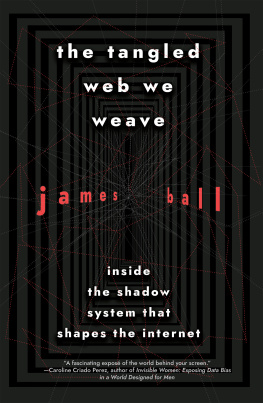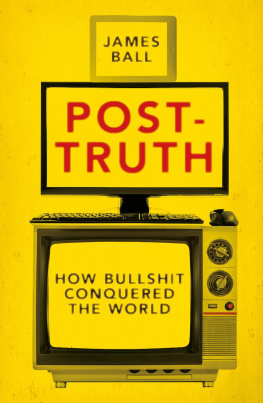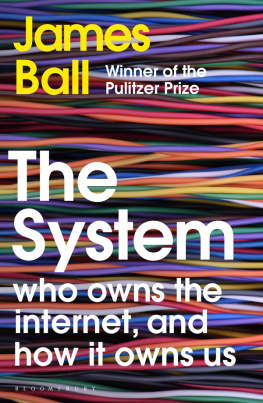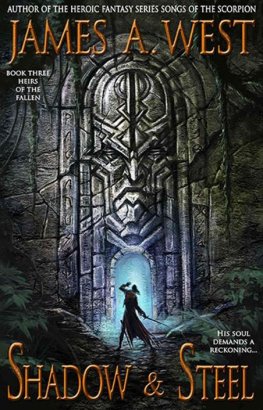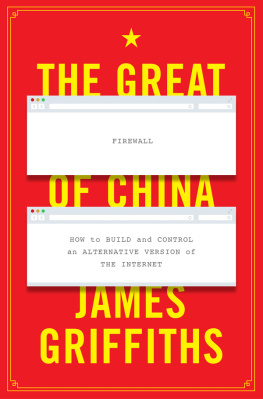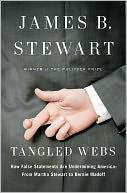James Ball - The tangled web we weave: Inside The Shadow System That Shapes the Internet
Here you can read online James Ball - The tangled web we weave: Inside The Shadow System That Shapes the Internet full text of the book (entire story) in english for free. Download pdf and epub, get meaning, cover and reviews about this ebook. year: 2020, publisher: Melville House, genre: Politics. Description of the work, (preface) as well as reviews are available. Best literature library LitArk.com created for fans of good reading and offers a wide selection of genres:
Romance novel
Science fiction
Adventure
Detective
Science
History
Home and family
Prose
Art
Politics
Computer
Non-fiction
Religion
Business
Children
Humor
Choose a favorite category and find really read worthwhile books. Enjoy immersion in the world of imagination, feel the emotions of the characters or learn something new for yourself, make an fascinating discovery.
- Book:The tangled web we weave: Inside The Shadow System That Shapes the Internet
- Author:
- Publisher:Melville House
- Genre:
- Year:2020
- Rating:4 / 5
- Favourites:Add to favourites
- Your mark:
- 80
- 1
- 2
- 3
- 4
- 5
The tangled web we weave: Inside The Shadow System That Shapes the Internet: summary, description and annotation
We offer to read an annotation, description, summary or preface (depends on what the author of the book "The tangled web we weave: Inside The Shadow System That Shapes the Internet" wrote himself). If you haven't found the necessary information about the book — write in the comments, we will try to find it.
The tangled web we weave: Inside The Shadow System That Shapes the Internet — read online for free the complete book (whole text) full work
Below is the text of the book, divided by pages. System saving the place of the last page read, allows you to conveniently read the book "The tangled web we weave: Inside The Shadow System That Shapes the Internet" online for free, without having to search again every time where you left off. Put a bookmark, and you can go to the page where you finished reading at any time.
Font size:
Interval:
Bookmark:
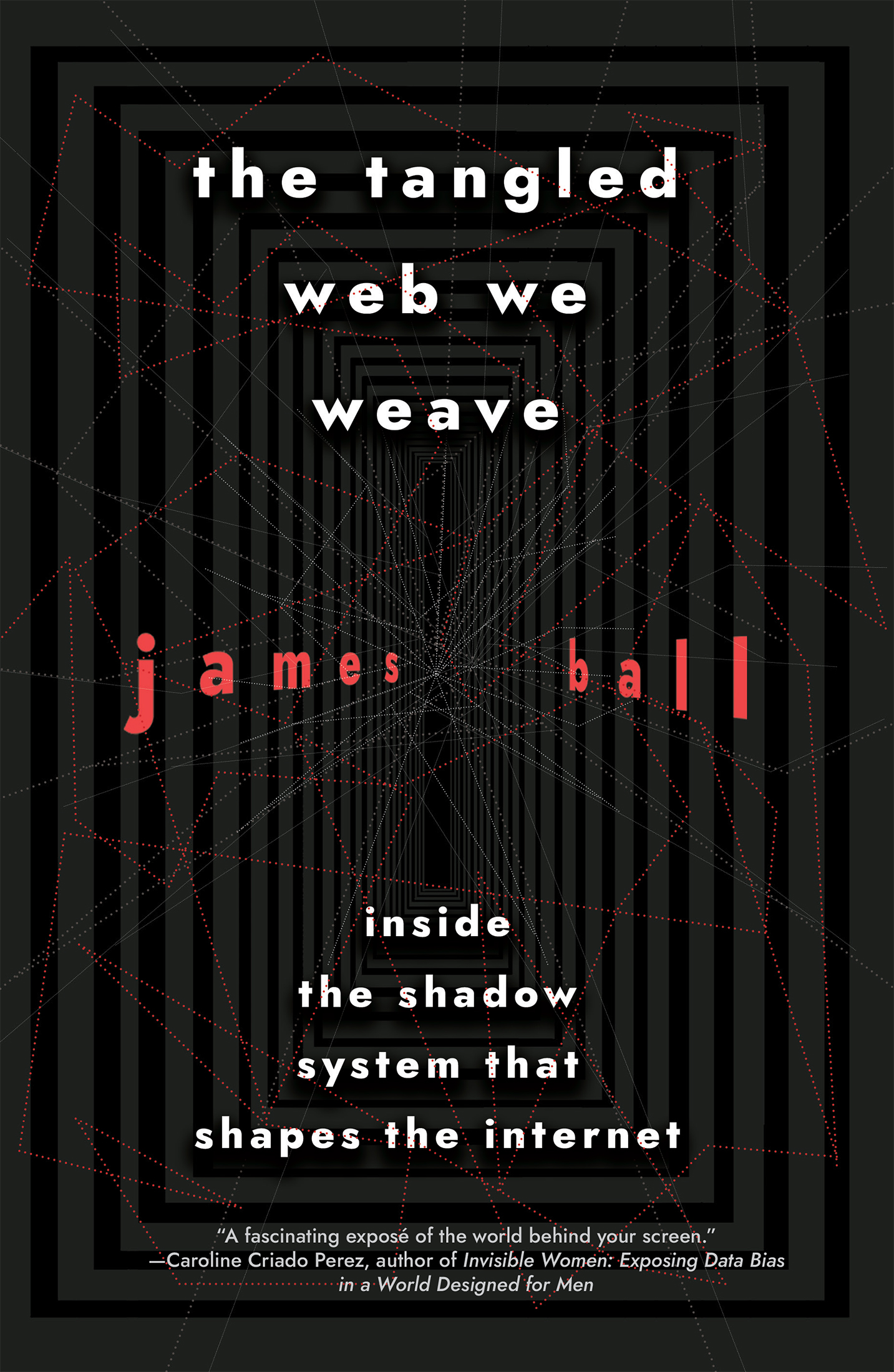
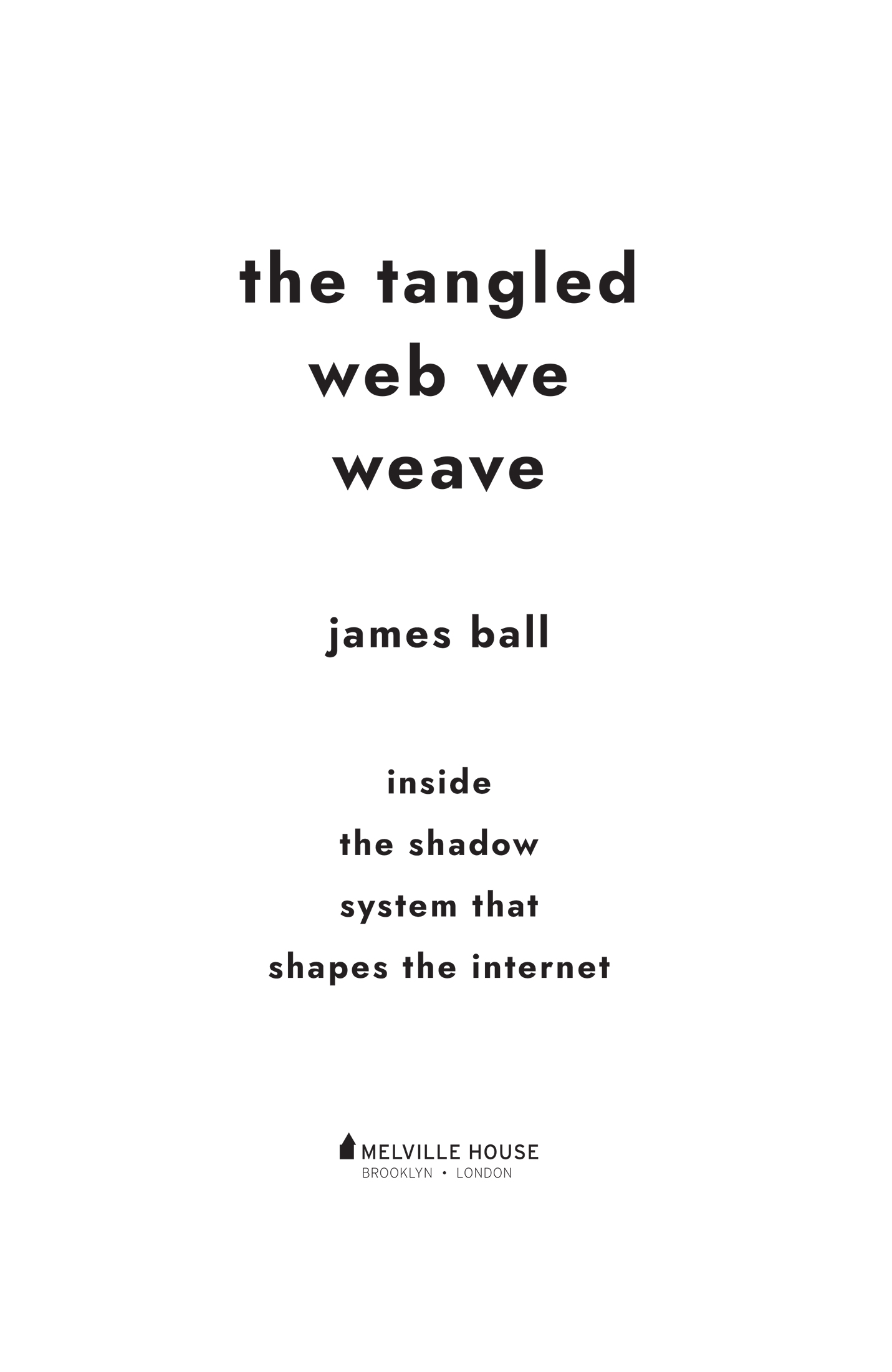
First published in 2020 in Great Britain as The System by Bloomsbury UK.
Copyright James Ball, 2020
All rights reserved
First Melville House Printing: October 2020
Melville House Publishing
46 John Street
Brooklyn, NY 11201
and
Melville House UK
Suite 2000
16/18 Woodford Road
London E7 0HA
mhpbooks.com
@melvillehouse
ISBN9781612198996
Ebook ISBN9781612199009
Library of Congress Control Number: 2020940260
A catalog record for this book is available from the Library of Congress
a_prh_5.6.0_c0_r0
For our future overlords
THE INTERNET WAS supposed to be a thing of revolution.
From the first days of coming to the publics attention, it was connected to a certain type of counter-culture to cypherpunks and hackers, people learning, exploring and challenging authority. As early as the 1990s there was a declaration of online independence, telling the powers that be in the old world to stay away. A new order would surely emerge.
Even when business came to the internet world, it was going to be different. The reach and scale of the internet would enable a long tail of small and independent producers to flourish. Online companies were launched talking in earnest terms of changing the world, with dont be evil mantras alongside and generous share options making even their office decorators rich.
For a long time, you could convince yourself it was all the real deal. At the start of the last decade, WikiLeaks used its unique online platform to challenge the worlds biggest superpower with an unprecedented series of leaks. Shortly afterwards, the worlds biggest social media companies were credited with boosting Arab Spring protests against corrupt and dictatorial governments.
Such was the mood towards the internet that the exultant opening ceremony to the 2012 London Olympics culminated in a seventeen-minute dance sequence celebrating Tim Berners-Lee for creating the World Wide Web and giving it to the world for free. Berners-Lee himself featured, tweeting the words This is for everyone as they simultaneously appeared in lights across the stadium. The internet was almost indisputably a thing to be celebrated.
Thats not the spirit of the world at the start of a new decade. The internet giants are viewed with mistrust, accused of playing a role in spreading misinformation, enforcing censorship and avoiding taxes. Its billionaires are scrutinized and condemned for their working practices. Residents around the palaces of Silicon Valley have come to resent their corporate neighbours.
Has the internet and the people running it changed so much in such a short time? Did we get them wrong all along? Or is the problem with what we suspect theyve been up to?
One thing, at least, is clear. The worlds biggest technology companies are now the worlds biggest companies full stop and they are not ready for the scrutiny that goes along with that. From being hailed as disruptors and the good guys shaking up the system, they have suddenly discovered they are the system.
The easy route and the conventional wisdom is to say that the dream has gone bad, that an engine of tremendous potential has been wasted. That story says also says the dream can be reclaimed: the internet is still inherently a force for good, a democratising power.
Its a story that needs a villain, and there are no shortages of candidates on offer: the bosses of the technology giants, the agents of Russias intelligence agencies, dictators and party bosses across the Middle East and into the Great Wall of China, whoever. These people are standing in the way of the dream move them and the internets disruptive power for good will be restored.
Its a tempting story. Its a story many armchair pundits want to tell. But its not the story of this book.
Whether they are loved or loathed, the four companies we always talk about when we talk about the internet Amazon, Apple, Facebook and Google (now formally known as Alphabet) are not the internet itself. They are products of the internet, engines running along the railway lines set out by the internets very structure.
Despite its lofty language the use of words like the cloud, language which suggests something free and natural, beyond the control of people the internet is a network of physical cables and connections. Its a web of wires enmeshing the world, connecting huge data centers to one another and to us, storing and sharing the innermost details of our lives.
Each of those cables is owned by someone, as is each of those data centers and every piece of that data is also owned by someone, and that someone is almost never the person who that data is about. In turn, each of those owners was backed and financed by someone, and each physical site lies in the jurisdiction of a government and a myriad of regulators. We refer to the online world as if its abstract from the reality we all occupy every day: this is a myth, and its a myth that obscures where the real power lies.
Online power is offline power: the internet has handed more power, control and money to the people who already had plenty. It may have changed the people in one or two seats at the top table, but it has not changed the system itself in any ways that matter.
Systems dont build themselves. The internet and the way it works were all human decisions, made by groups of men its almost always men in small rooms, with their own particular ideologies, motivations and divisions. This book aims to take you into those rooms, to meet those men, to find out why they made the decisions they did, and what the consequences were for them, and for us. Not all of them are household names, but each of them has helped shape the internet, and the world the internet has shaped, in profound ways.
The internet is fundamentally hard to think about and hard to understand, despite the fact that more than three billion of us use it in some form every day. What do we even mean when we talk about the internet? Do we mean the World Wide Web, what we see from our browser? Do we include the banking networks that now operate online, between businesses, almost every time we buy something? Do we mean the complex series of rules and protocols that govern flows of data across the world? Do we mean the business model behind it all, joining and auctioning our data, thousands of times a day, always out of our sight?
Most of these issues arent in our daily thoughts, and often seem too technical to be worth understanding. But its these things that shape the real internet the big four tech giants are products of all of these factors.
Looking into the architecture of the internet who built it, who governs it, how it works, and who funds it becomes, then, a way of looking at the real power structure of a huge swathe of the modern world. While we might think of Mark Zuckerberg, Larry Page, Jeff Bezos or the other charismatic dotcom CEOs as the new rulers of the world, theyre just the tip of an iceberg. Its time to see what lies beneath.
I am at my very core a creature of the internet. My earliest childhood had computers hooked up via creaking modems to the bulletin boards that were the precursor of the popular web.
As an adult, my childhood obsession had metamorphosed into using the internet, and working to chronicle it as a tech journalist, as a WikiLeaks staffer, as someone later working on the NSA (National Security Agency) leaks from Edward Snowden, who documented how the intelligence agencies dominated the networks that had felt like my home.
Font size:
Interval:
Bookmark:
Similar books «The tangled web we weave: Inside The Shadow System That Shapes the Internet»
Look at similar books to The tangled web we weave: Inside The Shadow System That Shapes the Internet. We have selected literature similar in name and meaning in the hope of providing readers with more options to find new, interesting, not yet read works.
Discussion, reviews of the book The tangled web we weave: Inside The Shadow System That Shapes the Internet and just readers' own opinions. Leave your comments, write what you think about the work, its meaning or the main characters. Specify what exactly you liked and what you didn't like, and why you think so.

